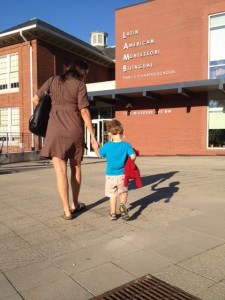 In the airy, sun-filled space that will house my son’s foray into formal education, I watched as a tow-headed classmate named Thomas patrolled the edges of the room, choking back tears.
In the airy, sun-filled space that will house my son’s foray into formal education, I watched as a tow-headed classmate named Thomas patrolled the edges of the room, choking back tears.
It was the first day of school – and my wife and I were doing our best not to hover too closely over Leo, who was, thankfully, already hard at play in the newly discovered puzzle section. Leo’s co-teachers, Ms. Allison and Ms. Luz, were busy greeting (and consoling) parents, organizing materials, and helping the 28 children – each one their family’s own special miracle – find a way to feel comfortable amidst an unfamiliar world.
For a few moments, I noticed that Thomas was alone. He wandered purposelessly in search of ballast, his cheeks streaked with salty tears. Another boy in the class noticed, too – clearly a veteran of this multi-age classroom where children spend their first three years of school with the same teachers. Without any adult prompting, he went over to Thomas, took hold of his hands, and gave him a welcoming hug.
I felt as grateful as if Thomas had been my own child. Such compassionate behavior in someone so young was a clear reflection of two things: his parents, and his teachers. Sarah and I gave Leo a final hug and walked quickly out of the room, choking back our own tears. It was someone else’s turn to help raise him.
I’ve worked in schools my whole adult life, so I’m more aware than most of the daily challenges and rewards of being a classroom teacher. I’m less aware of how different the classroom starts to look when your own child is in it. But I’m starting to see now how easy it is, if we’re not careful, to view the miniature world of our children’s classrooms through a single, self-serving lens – what is being done to meet the needs of my child, all day, every day?
On one level, this is not an unreasonable question. When we turn our children over to their schools and teachers, we are required to take a serious leap of faith. And, to be sure, I expect Leo’s teachers to get to know him well, to help him understand his own strengths and weaknesses, to give him comfort and challenge him, and to help him fall in love with learning. I also recognize that some days will be better than others, that he is one of many, and that his teachers are not superheroes. Like the rest of us, they are works in progress.
I worry sometimes that we have lost sight of the monumental, sometimes insurmountable challenges of being a classroom teacher. It is the most difficult, most rewarding job out there – filled with daily doses of a complex web of human relationships, emotions, needs and aspirations. Of the 3.2 million teachers in the United States, nearly two out of five are still in their twenties. Nearly nine out of ten are (still) female. And despite the surge of support for better pay, no one is in it for the money.
We know this. Yet we tolerate or participate in conversations about school reform that paint teachers into a two-dimensional corner – you’re either an aging, selfish laggard coasting to a cushy, state-supported retirement package, or you’re a youthful, sleep-deprived warrior willing to forgo any sense of work-life balance to personally deliver your students to the promised land. I’ve met and worked with both stereotypes – and I’d say they account for no more than 5% of the workforce.
Throughout the rest of the profession, you’ll find committed adults like the ones my son has. You’ll find curious professionals who are always searching for ways to get better at their craft. And you’ll see people who are trying to transform the way we think about school by replacing the timeworn expectation that the child must adapt to the school with the revolutionary notion that the school must adapt to the child.
That sort of personalization and support is the sort of vision of schooling our children need. It’s also a lot harder to do well, day in and day out. It is, in other words, not the sort of thing teachers can fulfill by themselves.
So let’s keep our expectations for our nation’s teachers high and fair. Let’s keep our cool when everything doesn’t unfold exactly as we’d like it. And let’s do our part as parents to ensure that every classroom is not just filled with caring adults like Ms. Allison and Ms. Luz, but also with compassionate children like the boy who helped make Thomas feel at home.
(This article also appeared in the Huffington Post.)
liz lerman says:
beautiful writing today as so many start their first day…not just the children but the parents too. Reading a serious post like this also reminds us that we make the and remake the best theory out of personal experience. Can’t wait to see what else you observe as the year(s) unfold for your son, your family, your school,..
Andrea Grannemann says:
Touching and sentimental. I dropped my son off for kindergarten this year.
I identify with the superhuman teacher; mostly in the uberhuman regard.
As a teacher, this is the moment I have most been looking forward to.
I am reminded of the idea of “In loco parentis” and exercise that judgment daily.
Teachers need not a break, but credit where credit is due.